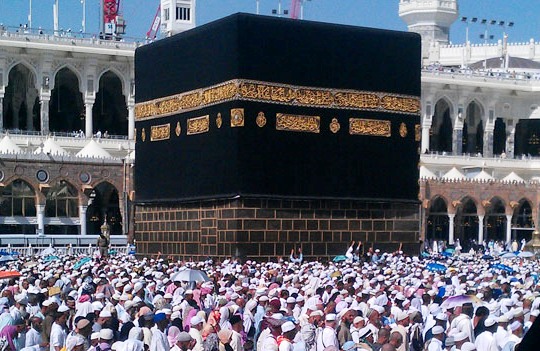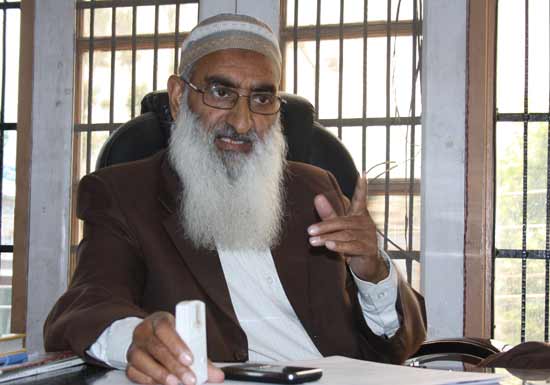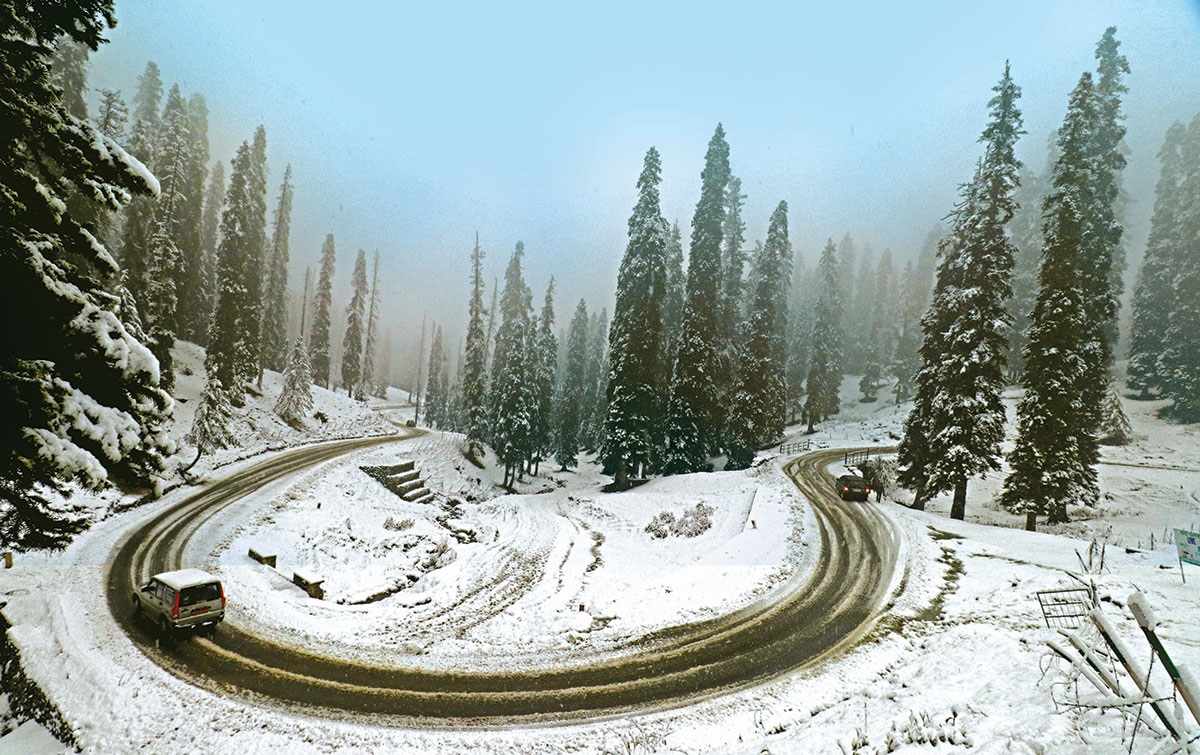With an estimated value of 100 crores, Hajj and umrah services is emerging as a big market in Kashmir, boosting the entry of private operators. Haroon Mirani reports.

With the start of process of hajj pilgrimage, private tour operators are coming up with attractive offers for the intending Muslim pilgrims. The government’s slashing of 190 seats from previous year’s quota works to their advantage, though, sources say, New Delhi is likely to grant more seats to state quota.
The Government of India has allotted 5861 seats for the hajj pilgrims from Jammu and Kashmir this year, a decrease of 190 from previous year. Of these 854 people have been pre selected as their applications have been repeatedly rejected for the last three years. The rest, 5007, were selected from the draw of lots for every district.
The central Hajj Committee of India, which oversees the annual hajj pilgrimage from India, sends the pilgrims either through subsidised government packages or through private operators.
Last year 1.23 lakh pilgrims went on hajj from entire India. Of them 47000 were sent through private tour operators and the rest under subsidised government scheme.
As government schemes attract a lot of applicants the selection is made through draw of lots, while private operators work on first come first serve basis.
Under the government scheme, there are three categories; Green, White and Azizia, which entail different charges and services.
Abdul Salam Mir, executive officer state hajj committee says that Green category also known as A category is the most expensive.
For Green category a Hajji is charged Rs 1.25 lakh, around 15000 rupees more than the last year. Mir says the hike has been made due to increase in the airport charges and airfare. White category pilgrims have to pay Rs 1.15 lakh per passenger and under Azizia category it costs Rs 1.10 lakh per pilgrim. “Around Rs 26000 is refundable and it is given back to the pilgrim,” says Mir. This year hajj is going to start around October 6, 2010.
The demand for hajj travel is much more than the actual people who are able to take up the journey. “This year we received 22785 forms from the people who wanted to go on Hajj,” says Mir.
The Hajj pilgrimage has added to the work of passport office as last year Saudi authorities made international passports mandatory for the pilgrims. Earlier pilgrims would travel on temporary Hajj passports. “This has added to our work, many a times leading to complications,” said Mir.
 Officials say that the passport is becoming a big problem as people are not applying for passports in time. “Even now many people have not applied for passports which usually add to our problems,” said Mir. “We have already sent the list of this year’s Hajj pilgrims to passport office and asked for the speedy issuance (of their passports).”
Officials say that the passport is becoming a big problem as people are not applying for passports in time. “Even now many people have not applied for passports which usually add to our problems,” said Mir. “We have already sent the list of this year’s Hajj pilgrims to passport office and asked for the speedy issuance (of their passports).”
Of the 5861 pilgrims, only around 1300 have got their passports. “Rest of the cases are in different stages of passport issuance,” said Mir. “This means around 4500 passports are yet to be issued.”
Off late, hajj pilgrimage via private tour operators is also picking up, where charges start from around Rs 1.65 lakh. “As awareness increases among people, they are also coming towards us,” said Abdul Rashid Mir, chief executive of Al Khuddam hajj and umrah services.
Al Khuddam is the largest hajj and umrah services operator in Kashmir. Last year the company sent 230 pilgrims on Hajj. Rashid says that the pilgrims going for hajj through private operators get more and better services than pilgrims using government service.
“Private services operate under strict rules and guidelines, and the competition in the sector compels them to offer best service, which is not the case with government service,” said Mir. “If any operator falls on account of services or if the pilgrims complain of poor services, then the Government of India cancels its registration. So there is a check unlike the government services where nobody is held accountable for lack of or deficient services.”
Though the government scheme is low cost, Rashid says the pilgrims have to do cooking, washing and other activities, leaving limited time for prayers. “Under private operators pilgrims are free to spend their time in prayers as they are provided all such services by the operators,” he said.
This relieves people from the burden of carrying too many household and other items. “They have to carry minimum luggage,” Rashid said.
Al Khuddam’s package starts from 1.85 lakh and the high end hajj package costs Rs 2.50 lakh per person.
There is flexibility of type of accommodation and duration too. “There is no cap on duration of stay at Saudi Arabia during Hajj. Some can return within 18 days like businessmen or some can stay for over a month visiting other places,” said Abdul Rashid. “Besides accommodation facility is also flexible ranging from 5 star to basic type depending on the package a person chooses.”
Under government scheme there is one guide or Khadim for every 300 pilgrims while as it is one for every 100 pilgrims under private tour operators, giving more guidance to the pilgrims. “Some tour operators also take Ulemas with them who conduct daily classes for the pilgrims to guide them in every aspect,” said Abdul Rashid.
Over the years, umrah (lesser hajj) is also picking up. Abdul Rashid estimates that around 100 people go for umrah through private tour operators every year from the state. “In addition to it some go with their families on their own,” said Abdul Rashid.
The number of private tour operators have also mushroomed in the state. As there is no geographical limitation for a private tour operator, who can take pilgrims from anywhere in India, so virtually all 616 tour operators registered with Government of India for conducting hajj pilgrimage can take pilgrims from J&K. “Private hajj tour operators can select pilgrims from every state and that is why we are seeing sub-agents for big tour operators mushrooming in the state,” said Abdul Rashid.
The Saudi government has fixed one seat for every 1000 Muslims in every country which corresponds to 1.23 lakh seats for India as per 2001 census.
However, Rashid is optimistic about an increase in the hajj quota for India. “First there is a huge expansion plan going on in Makkah Sharief, which will increase its capacity from current three million to five million pilgrims by 2012,” said Abdul Rashid. “Second if our census shows the increase in Muslim population then our seats will also be increased by the Saudi government.”
The hajj and umrah is emerging as a big market. Experts estimate the value of the industry at around 100 crore rupees, bulk of which goes into airfare. “Besides, a pilgrim at a minimum spends around Rs 20,000 during the Hajj. Pre-hajj shopping also costs a bare minimum of Rs 1200,” said Rashid. “Now there is trend of wazwan before and after the Hajj, which costs a pilgrim dearly and even farewell parties are extravagant.”
Rashid lamented that the hajj is becoming more of pomp and show. Pilgrims belonging to Shia sect also prefer to visit their revered religious sites like Karbala in Iraq and other sites along with the hajj pilgrimage. “The private tour operators have devised such packages which take care of their needs,” said Abdul Rashid.
With a big industry of pilgrim tourism in the making, the private tour operators are continuously churning out new packages with some offering visits to Shrines of Syed Abdul Qadir Jeelani in Baghdad Iraq and Shah i Hamdan in Khatlan Tajikistan. There are about two dozen tour and travel operators who offer hajj and umrah services in the state.















